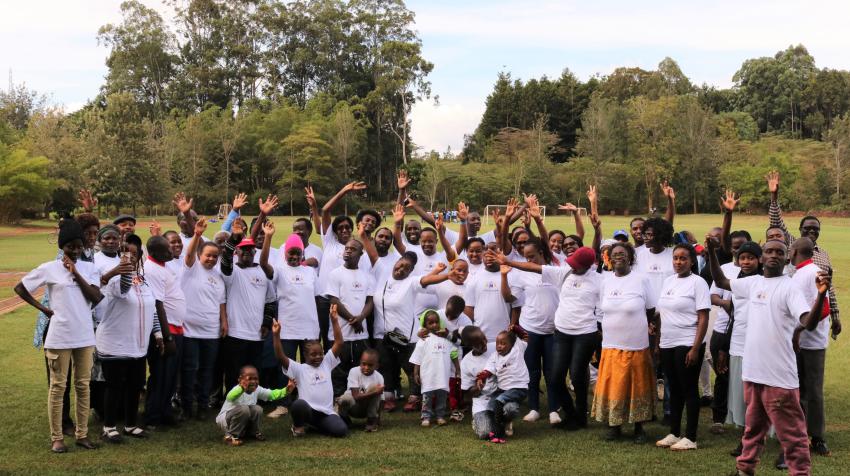27 April 2022
Every year, nearly 3 million people die due to exposure to common risk factors in the workplace. Work-related diseases were responsible for 81 per cent of all work-related deaths in 2016, with an estimated 745,000 deaths attributed to diseases caused by long working hours.
Since the 1980s, the world has recognized Workers’ Memorial Day, which honours those workers killed, injured or disabled on the job. Since 2003, the International Labour Organization (ILO) has commemorated the World Day for Safety and Health at Work annually on 28 April, promoting good practices for occupational safety and health (OSH) and shedding light on key related issues.
Throughout the COVID-19 pandemic, the world has become aware of the importance of having a strong OSH system, one that includes meaningful participation by governments, employers, workers, public health actors and other relevant parties, to protect working environments as well as the safety and health of workers.
This year’s observance of the World Day for Safety and Health at Work will focus on the theme of acting together to build a positive safety and health culture. At the workplace level, a strong OSH culture is one in which the right to a safe and healthy working environment is valued and promoted by both management and workers. A positive OSH culture is built on inclusion through the meaningful involvement of all parties in the ongoing improvement of safety and health at work. Where such a culture is in place, workers feel comfortable raising concerns about possible OSH risks or hazards, and management is proactive in collaborating with workers to find appropriate, effective and sustainable solutions. This requires open communication and dialogue built on trust and mutual respect.
Governments and social partners can actively participate in all phases of OSH decision-making processes through effective social dialogue. This is important, from the development and revision of OSH policy and regulatory frameworks to address persistent and new OSH challenges, to actual application at the workplace level. Social dialogue not only contributes to improving OSH policies and strategies, but it is also essential to building ownership and commitment, and facilitating their rapid and more effective implementation.

During the pandemic, governments that prioritized the active participation of employers’ and workers’ organizations in OSH governance were able to develop and implement emergency laws, policies and interventions efficiently.
The collaboration between and among actors in the world of work has been essential in ensuring that the measures put in place are acceptable to and supported by employers and workers, and were therefore more likely to be effectively implemented in practice. In many countries, this resulted in the adoption of legal requirements covering different areas—from measures to prevent and deal with COVID-19 cases in the workplace to telework arrangements.
In Austria, for example, social partners negotiated an agreement on systematic testing in the workplace for particular sectors that faced an increased risk of viral transmission, such as the retail sector. In Singapore, changes to rules on vaccination took place after consultations and discussions with tripartite partners—governments, employers and workers. In South Africa, tripartite discussions were held to amend measures targeting the spread of COVID-19 in workplaces.
Tripartite dialogue at the national level has sometimes been followed up with further consultation at the regional or sectoral level, so that actions taken to deal with the effects of the pandemic might be adapted to a specific context. In Finland, for example, trade unions and employers’ organizations worked closely with the Government to develop measures for the tourism and restaurant sectors. In Italy, social partners in the banking sector created detailed rules on telework, which outlined the right to privacy and the right to disconnect.

Building a positive safety and health culture in the workplace ensures that employees feel comfortable raising concerns about possible OSH risks or hazards at work, with management collaborating with them proactively to find appropriate, effective and sustainable solutions. According to recent research, over 300 million workers from 142 countries feel that they cannot report safety issues to their employers without fear of punishment. This absence of discussion can lead to serious safety and health risks, as the probability of workers suffering a serious injury at work correlates strongly with their opinion that they cannot report safety issues. In workplaces with higher worker engagement, 64 per cent fewer safety incidents and 58 per cent fewer hospitalizations are recorded.
Creating a positive safety and health culture in the workplace not only prevents human suffering and ill health, but also benefits workers and employers alike. Safe and healthy working conditions contribute to higher productivity and job satisfaction among workers. Building a strong OSH culture thus promotes success at all levels within an enterprise, which, in turn, can support positive outcomes in the larger society.
Observance of World Day for Safety and Health at Work 2022 will feature a global webinar, and a report, poster and other promotional materials will be made available. For further information, please visit the dedicated ILO website linked here.
The UN Chronicle is not an official record. It is privileged to host senior United Nations officials as well as distinguished contributors from outside the United Nations system whose views are not necessarily those of the United Nations. Similarly, the boundaries and names shown, and the designations used, in maps or articles do not necessarily imply endorsement or acceptance by the United Nations.




